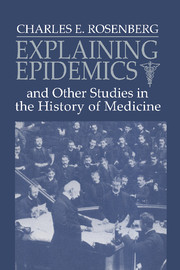Book contents
- Frontmatter
- Contents
- Acknowledgments
- Introduction: Why care about the history of medicine?
- I Ideas as actors
- 1 The therapeutic revolution: Medicine, meaning, and social change in nineteenth-century America
- 2 Medical text and social context: Explaining William Buchan's Domestic Medicine
- 3 John Gunn: Everyman's physician
- 4 Body and mind in nineteenth-century medicine: Some clinical origins of the neurosis construct
- 5 Florence Nightingale on contagion: The hospital as moral universe
- 6 Cholera in nineteenth-century Europe: A tool for social and economic analysis
- II Institutions and medical care
- III The past in the present: Using medical history
- Index
5 - Florence Nightingale on contagion: The hospital as moral universe
Published online by Cambridge University Press: 29 March 2010
- Frontmatter
- Contents
- Acknowledgments
- Introduction: Why care about the history of medicine?
- I Ideas as actors
- 1 The therapeutic revolution: Medicine, meaning, and social change in nineteenth-century America
- 2 Medical text and social context: Explaining William Buchan's Domestic Medicine
- 3 John Gunn: Everyman's physician
- 4 Body and mind in nineteenth-century medicine: Some clinical origins of the neurosis construct
- 5 Florence Nightingale on contagion: The hospital as moral universe
- 6 Cholera in nineteenth-century Europe: A tool for social and economic analysis
- II Institutions and medical care
- III The past in the present: Using medical history
- Index
Summary
While collecting materials some years ago for a history of the American hospital, I became increasingly interested in Florence Nightingale – one of the few individuals who exerted a peculiar and indispensable influence on that history. At first that influence seemed as difficult to understand as it was undeniable; her ideas were typical of the accepted wisdom of her generation, but were anachronistic by the 1880s and 1890s. An explanation seemed in order. And that explanation, I became convinced, lay in her ability to invoke a language of shared moral and conceptual reference, to articulate a world-view that at once explained the hospital's present evils and demanded their reform. It was in some ways her power as rhetorician as much as her social position and skill in bureaucratic infighting that explained Nightingale's enduring influence in nursing and hospital reform. But her ways of thinking about the world are very different from those we have come to accept in the twentieth century. As in understanding traditional therapeutics, understanding Nightingale's social impact means taking ideas seriously, no matter how alien and even inconsistent they may seem (or in her case how transparently they express a seemingly self-serving and hegemonic vision of social control). It means seeing their ultimate consistency, their ability to function as an explanatory, monitory, and hortatory system. Only then can a historian begin to appreciate her ability to mobilize the sentiments of so many of her contemporaries.
- Type
- Chapter
- Information
- Explaining Epidemics , pp. 90 - 108Publisher: Cambridge University PressPrint publication year: 1992
- 2
- Cited by



